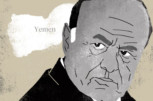
It is coming up to two years since President Abd Rabbo Mansour Hadi of Yemen was sworn in, in February 2011. After a thirty-year rule by the brutal, corrupt and dictatorial regime of Ali Abdullah Saleh, Yemen needs several years to reinvent itself as a modern pluralistic society. No one should expect miracles. But nothing can be achieved as long as the grievances of the people of South Yemen are not addressed, and they will not rest until that happens.
That old and tired emotional argument that we cannot accept fracturing the country into South and North does not hold water, and each region could easily survive without the other as an independent state, now that the people in both regions have learnt their lessons about co-existence. On the other hand, a united geographical Yemen, provided the population of the South is treated as an equal in every way, would have an obvious advantage. Having survived four years of Sana’a, I can easily appreciate that!
The Yemen Post quoting Sky News, this week reported that Yemen sits on the world’s largest oil reserve, with a pocket stretching from Yemen’s northern territories up to its border with Saudi Arabia, at a depth approaching 1,800 metres. If true, the interest of foreign powers in such untapped riches will clearly multiply, since stability of an oil supply that does not have to traverse the Straits of Hormuz is paramount.
There are important foreign players, both from the Arab World and the west, who would like Yemen to remain one entity, each with its own motive and future agenda. They have been actively meddling in Yemen’s politics, each with its own group of supporters among Yemeni decision makers.
The main one, of course, is the US. Yemenis often refer to Ambassador Feierstein as the de-facto ruler of Yemen. Articles on websites such as Emptywheel ask “Is Ambassador Feierstein drawing up the kill lists in Yemen?”
This refers to the American policy of assassination by drone, something that was initiated as long ago as 2002 by former president George W. Bush, but enthusiastically adopted and accelerated by President Barack Obama, first in Pakistan, now in Yemen. The expected appointment of John Brennan does not bode well for thousands of innocent Yemenis, because his definition of “combatant” and “militant” seems to be any military-age male in a strike zone! Here is a must read article: http://www.informationclearinghouse.info/article33572.htm
Since Yemen, like most third world countries with a relatively young population, is where young males abound in streets and congregate in corners, we can expect even more executions of innocents. Even US citizens do not have the basic right of due process. This week we heard that the exit from Afghanistan will be “fast tracked”. Will Yemen become the “drone centre” of the world?
And just like Saleh, who had covered up US involvement by falsely claiming that the executions were conducted by Yemeni forces, Hadi seems to have taken the side of the US against his own people. But he is not alone. Such cannot happen without the collusion of the prime minister, the defence minister and the foreign minister, who one day will be called to account.
In fact, the foreign minister in an August 2012 Arabic interview with Sky News, was asked why American drones “tasrah wa tamrah”, that is, come and go at will in Yemeni skies. His answer was that since the Yemeni government did not have such equipment, they have to ask Americans to do the job. In other words, Yemen would gladly do it, if only it could, and human rights be damned! Ironically, he happens to be a physician!
What he might want to remember is that the Americans will leave Yemen in a handful of years, just as with Iraq and soon Afghanistan. The surviving sons of those wrongfully executed by drones will sooner or later come after them, personally, or after their children and will call it justice, or perhaps like the US, “collateral damage”.
Among Yemenis, the evidence is that these indiscriminate executions whether you call them “collateral damage” or not, have only succeeded in stoking deep resentment and an unwavering desire for revenge, part of tribal culture; as well as increasing recruitment into the ranks of the militants. And let us not forget that for every execution, there are several horrendous permanent injuries to innocents.
Will Hadi, abetted by his inner circle, learn from the mistakes of his predecessor, or will his clinging to power blind him to the suffering of innocent Yemeni victims? His recent appointment of numerous commanders from his own tribal area of South Yemen — presumably ones he can trust against a likely military coup by General Ahmad Saleh — suggests the latter.
Dr Qais Ghanem is a retired neurologist, radio show host, poet and novelist. His two novels are Final Flight from Sana’a and Two Boys from Aden College. He lives in Canada.









